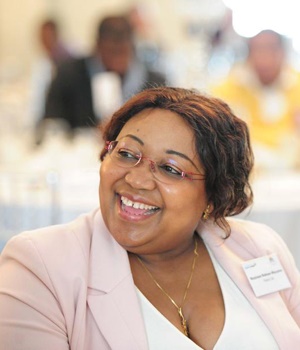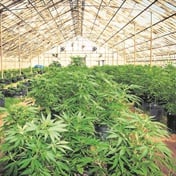
Johannesburg - State oil and gas company PetroSA and its suspended CEO Nosizwe Nokwe-Macamo have parted ways.
Nokwe-Macamo, together with chief financial officer Lindiwe Mthimunye-Bakoro, had been on suspension since June after the two refused to go on “gardening leave” while the financial state of the company was examined.
On Friday, PetroSA announced that it has reached agreement with Nokwe-Macamo “on the termination of her employment with effect from [today] on mutually acceptable and amicable terms”.
“The terms of the agreement were confidential,” PetroSA said.
The announcement comes in the same week as PetroSA will have to appease its employees if it wants to continue with the planned voluntary retrenchments announced earlier.
PetroSA posted a R14.6 billion loss for the 2015 financial year, the biggest of any state-owned enterprise since 1994. This week, it announced it would offer voluntary retrenchments and take on “partnership options” to “diversify risk”.
While PetroSA spokesperson Thabo Mabaso refused to divulge what employees were being offered to leave, chemical and energy union Ceppwawu said the packages that were being offered amounted to two weeks’ pay for each year worked.
“It’s very low; it’s nothing,” Chinaman Melani, the union’s Western Cape regional secretary, told City Press this week.
While discussions were ongoing, the union has advised its members to take nothing less than four weeks’ salary for each year worked, as well as four months of their basic salary as a “sweetener”.
Melani said unless PetroSA made the packages more attractive, employees would not take them up, which would result in forced retrenchments regulated by the Labour Relations Act.
While PetroSA explores for and produces oil and gas, all its revenue comes from turning gas into fuel at its Mossgas plant near Mossel Bay. But depleting gas stocks – estimated to have between a year and two years left – have resulted in a scramble to find new sources.
The result has been the disastrous Project Ikhwezi, which has cost taxpayers R12.2 billion in impairments.
Ikhwezi was expected to deliver 242 billion cubic feet of gas from five new wells, but by the end of March, the project had only delivered 25 billion cubic feet from three wells.
Melani this week laid the blame firmly at the feet of PetroSA’s executive, saying: “We warned them the feedstock was low long ago.”
He said the “dubious decisions” that led to this year’s losses were not the fault of the employees and they shouldn’t be made to pay for it.
“They must clean out anyone who was involved in making those decisions,” he said.
Melani accused the executive of trying to “kill” the state-owned company and turn it into a private chemical company.
The possibility of voluntary retrenchments was first raised in February, when the company allegedly sent out a memo saying about 40% of its 1 800 employees would be laid off. PetroSA denied this was the case and said it was only engaging in a “process”.
In its annual report, acting CEO Mapula Modipa said the board was “generally not happy with the performance”, but “stringent safeguards” were in place to make sure it didn’t happen again.
Astonishingly, one such safeguard was the establishment of a “project management office” that would make sure such initiatives were only done using the “best mechanisms for success”.
This appears to imply that the best mechanisms for success had not been used with Ikhwezi. Another safeguard was Project Apollo, which was intended to develop a turnaround plan in six months.
Modipa this week moved fast to quell outrage over news it was going to sell state assets – this after the company had on Wednesday claimed it was considering selling six of its oil and gas offshore blocks and its interests in at least four more. But Modipa amended this to say PetroSA was only looking at entering into partnerships to diversify risk, generate revenue and create value.
Gross revenue decreased by 15% to R18 billion from R21.2 billion last year. The company’s asset valuation fell from R34 billion last year to R19.8 billion, and its cash balance fell by R1 billion to R4.1 billion.
But unless radical changes were made to the leadership, PetroSA was unlikely to improve its performance.
Economist Francois Stofberg from Econometrix this week said the company – like most other state-owned enterprises – suffered from a dire lack of strategically minded, business-savvy leadership.
PetroSA has been hobbled by backbiting and maladministration in the past year.
One major issue was the disastrous attempt to buy retail service station network Engen and an oil refinery owned by Malaysian company Petronas.
The deal allegedly fell through because CEO Nokwe-Macamo failed to put aside the cash needed for the purchase.
In addition, more than R2 billion was lost in failed exploration projects off the coasts of Equatorial Guinea and Ghana.
PetroSA’s devastating financial position comes at a time when South Africa’s desperate need for sustainable power sources – particularly in the next decade – has intensified the department of energy’s focus on gas.
Some of the biggest global oil and gas producers are turning their attention to the country as Energy Minister Tina Joemat-Pettersson fires up interest with promises that gas development needed to be prioritised.
But regulatory uncertainty is also putting the brakes on decision making. A contentious mining bill, placed under review, in which government would have a 20% “free carry” in oil and gas projects, as well as the ability to acquire the other 80% at an “agreed price”, was mooted last year.
Should the bill be passed, PetroSA would be radically boosted as new operations begin, but private sector companies are likely to balk.




 Publications
Publications
 Partners
Partners








